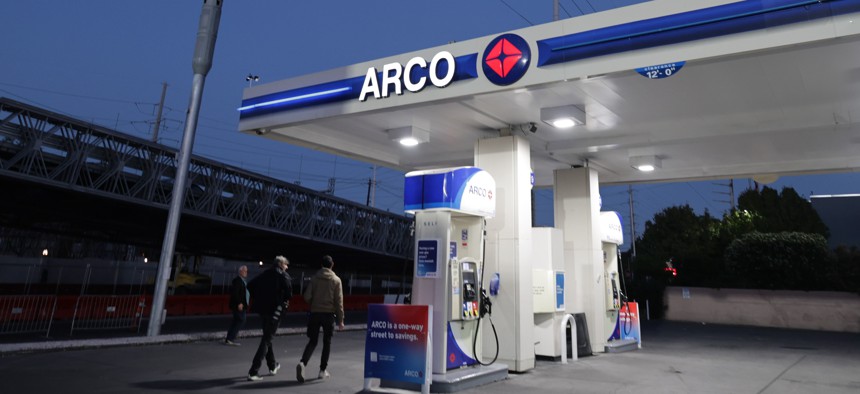Despite falling gas prices, some politicians push ahead with tax breaks

Jakub Porzycki/NurPhoto via Getty Images
Governors often suspend gas taxes for an easy political win with voters. But fuel taxes already face an uncertain future.
Falling gas prices are welcome news to holiday travelers, but some state officials insist that fuel taxes need to be lower to help drivers with the cost of filling up at the pump.
Gas prices have been falling for two months, and the average price of gasoline throughout the country is $3.27 a gallon, according to Patrick De Haan, the head of petroleum analysis for GasBuddy, a fuel-price tracking service.
“As millions of Americans gear up to hit the road for Thanksgiving, the national average is seeing its longest streak of declines in over a year, reaching a ninth straight week as gas prices fall to their lowest since January,” De Haan said in a blog post. “The fall in gas prices, largely seasonal due to weakening gasoline demand, could extend for another week or two, leading to potentially the lowest gas prices since 2021 by Christmas.”
The average price of gas in 11 states is lower than $3 a gallon, and five more might soon join those ranks, he said. Mississippi, Texas and Oklahoma have the lowest gas prices in the country, while California, Hawaii and Washington have the highest.
But the downward trend isn’t necessarily changing the political dynamics that make state gas taxes an easy target for politicians who want to show voters that they are acting on their everyday concerns.
In Georgia, which has the fourth-lowest gas prices in the country according to GasBuddy, Gov. Brian Kemp has used his emergency powers to block the collection of the state’s gasoline taxes for much of the last two years. He extended it again earlier this month, relying on the state’s financial reserves to backfill the lost revenue. The Georgia Legislature is expected to consider a longer extension when it convenes for a special session Nov. 29.
“Thanks to our responsible approach to budgeting, we’re able to deliver relief to families fighting through the disastrous effects of Bidenomics,” Kemp said in a statement. “I'm proud this action has helped keep millions of dollars in hardworking Georgians’ pockets and look forward to continuing to see that impact with the Thanksgiving holiday approaching.”
The state normally imposes a 31.2-cent tax for every gallon of gasoline and 35 cents for each gallon of diesel. Suspending the taxes is costing the state about $170 million a month.
Gas prices are also a perennial issue in California, which consistently has the highest rates in the country. But the reasons for those consistently high costs are not easily fixed. The state has relatively few refineries to meet the demand of its motorists, and it requires special blends of gasoline (particularly during the summer) because of its notorious air pollution. California also has some of the highest fuel taxes in the country.
A group of Republican legislators in the state dominated by Democrats called on Gov. Gavin Newsom in September to call a special session to suspend the state’s gas taxes.
“California is an energy island with isolated resources which makes our state reliant on foreign imports if more domestic production is not allowed,” wrote the 28 GOP legislators. “By suspending the gas tax, everyday Californians can better afford to commute to work and drive their children to school.”
But Newsom blames the oil industry for gouging California motorists with high gas prices. He signed a law earlier this year that gives state regulators the authority to penalize oil companies for making excessive profits, the first law of its kind in the country. Newsom also pushed California’s air pollution regulators to ban the sale of new gas-fueled cars by 2035. And the governor has rejected earlier efforts to suspend the state’s gas tax, saying oil companies would pocket the difference.
With prices exceeding $6 a gallon in September, Newsom told state regulators to speed up the annual switch from summer blends of gasoline to cheaper winter blends.
Fuel taxes remain a salient issue on the campaign trail, as well. In Indiana, a leading Republican candidate for governor wants to roll back gas tax increases that a Republican-led legislature approved in 2018 to fund an infrastructure package. Under former attorney general Curtis Hill Jr.’s plan, the state’s gasoline taxes would drop from 34 cents a gallon to 18 cents.
Former South Carolina Gov. Nikki Haley, a Republican candidate for president, has also called for eliminating the federal gas tax, which has been at 18.4 cents a gallon since 1993. But she has come under fire, particularly from a group affiliated with Florida Gov. Ron DeSantis, another GOP presidential hopeful, for putting forward a proposal as governor that would have allowed the state’s gas taxes to increase in exchange for reducing income taxes. The plan never passed.
But the gas tax isn’t as politically poisonous in other states. The Democratic majorities in the Minnesota Legislature, for example, approved a $1.3 billion infrastructure package earlier this year that included a 5-cent increase in the state’s gas taxes.
Fuel taxes also face long-term uncertainties, as gas-powered vehicles become more efficient and electric vehicles become more prevalent. Several states and the federal government are considering taxing motorists for the miles they drive rather than the fuel they buy.
Daniel C. Vock is a senior reporter for Route Fifty based in Washington, D.C.

NEXT STORY: White House finalizes rule requiring states to target vehicle pollution






